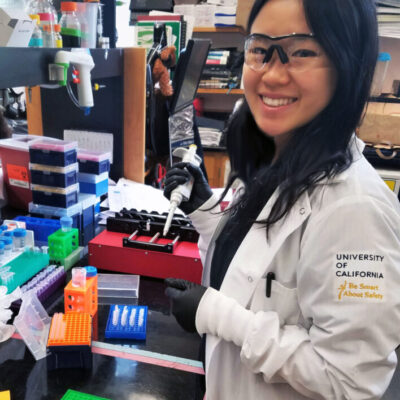Jazlyn Chong Rose Hills
CD36-mediated CoQ uptake is integral to normal BAT function
CoQ is an essential molecule in the electron transport chain (ETC) which acts as an electron carrier to help generate adenosine triphosphate (ATP) in the mitochondria. Therefore, without CoQ or under conditions of severe CoQ deficiency, the redox reactions required for efficient energy production are greatly hampered. The inordinately high levels of mitochondria in brown adipose tissue (BAT) also suggest that a CoQ deficiency could negatively and significantly impact the unique BAT function of thermoregulation through nonshivering thermogenesis. Defective BAT function could then lead to excess fat deposition, obesity, and other serious metabolic diseases. This summer, I will be exploring the scavenger receptor protein CD36 as a fatty acid transporter and its role in facilitating CoQ uptake into cells. I will be using BAT-specific CD36 Knockout mice to improve understanding of the physiological effects of CoQ deficiency in BAT, and subsequently, its effects on overall metabolic health. We aim to better characterize the mechanism and regulation of exogenous CoQ uptake, which have potential for widespread and beneficial health impact.
Message To Sponsor
I would like to once again express my gratitude for the Rose Hills Foundation which made my summer research experience possible. I realized the difference that it makes in my overall research experience when I am able to do research "full time," and I learned immensely during these past few months, in a way that was and is never possible for me during the school year. As I start my senior year at Berkeley and prepare for a thesis project on CD36 and Coenzyme Q, I am certain that my SURF experience has equipped me well with improved lab techniques and a deeper understanding of what research is, which I will apply towards my thesis as well as towards future projects. Thank you!